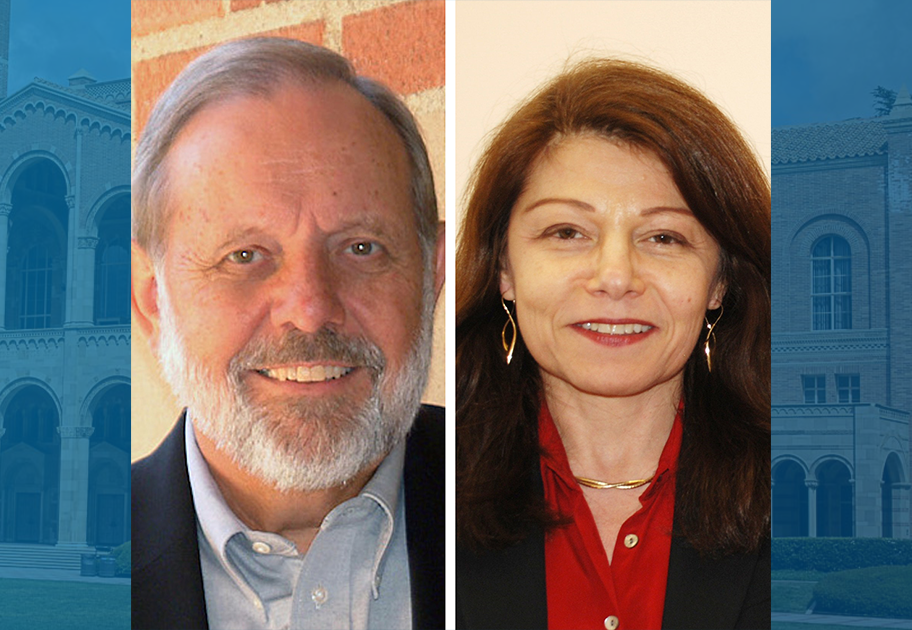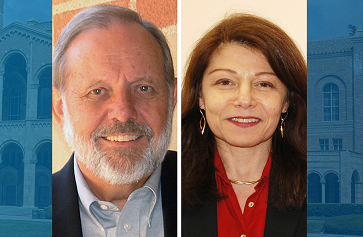Two UCLA College faculty members elected to National Academy of Sciences

Left: Professor Robert Bjork, Distinguished research professor of psychology; right: Professor Rosa Matzkin, Charles E. Davidson Distinguished Professor of Economics.
Editor’s note: Congratulations to all three UCLA faculty members elected to the National Academy of Sciences, including Professors Robert Bjork and Rosa Matzkin of the UCLA College!
By Stuart Wolpert | May 4, 2022
Three UCLA professors — Dr. E. Dale Abel, Robert Bjork and Rosa Matzkin — have been elected to the National Academy of Sciences in recognition of their distinguished and continuing achievements in original research. They are among the 120 new members and 30 international members announced by the academy May 3.
Membership in the academy is one of the highest honors a scientist in the United States can receive. Previous electees have included Albert Einstein, Robert Oppenheimer, Thomas Edison, Orville Wright and Alexander Graham Bell.
Dr. E. Dale Abel
William S. Adams Distinguished Professor of Medicine
Chair, department of medicine, David Geffen School of Medicine at UCLA
Executive medical director, department of medicine, UCLA Health
Abel is a distinguished endocrinologist, researcher and clinician who leads UCLA Health’s largest department. His pioneering work on glucose transport and mitochondrial metabolism in the heart has guided his research on the molecular mechanisms responsible for the cardiovascular complications of diabetes. Abel’s laboratory has provided important insights into how mitochondrial dysfunction and aberrant insulin signaling contribute to diabetes-related heart failure risk. His research has been continually funded by the National Institutes of Health since 1995, with additional support from the American Heart Association and other sources. Prior to joining UCLA on Jan. 1 of this year, Abel held leadership and faculty positions at the University of Iowa, Harvard Medical School and the University of Utah. Among his many awards and honors, Abel is an elected member of the National Academy of Medicine, the Association of American Physicians and the American Society for Clinical Investigation. He serves as president of the Association of Professors of Medicine.
Robert Bjork
Distinguished research professor of psychology
Bjork is widely regarded as one of the world’s leading scholars of human learning and memory. His research focuses on the ways in which the science of learning can inform instruction and training, including identifying techniques that can enhance long-term learning. He has served as editor of the journals Memory and Cognition, and Psychological Review. An elected member of the American Academy of Arts and Sciences, Bjork received the Association for Psychological Science’s highest honor — the James McKeen Cattell Fellow Award — in 2016, the Norman Anderson Lifetime Achievement Award from the Society of Experimental Psychologists and a UCLA Distinguished Teaching Award. He delivered a UCLA Faculty Research Lecture in 2016.
Rosa Matzkin
Charles E. Davidson Distinguished Professor of Economics
Matzkin has developed new ways of using empirical data for economic analysis. Her methods exploit properties of economic models to avoid restrictive specifications that may lead to incorrect conclusions. These methods can be used to identify and estimate unobservable variables, to test whether data are consistent with any particular model and to predict behavior and economic outcomes when economic structures change. An elected member of the American Academy of Arts and Sciences, Matzkin is currently first vice president of the Econometric Society and is a former member of the executive committees of the Econometric Society and the American Economic Association. She is co-editor of Elsevier’s Handbooks in Economics series and of Vol. 7 of the Handbook of Econometrics. Previously, she served as chief editor of the journal Quantitative Economics, as co-editor of the Econometric Society Monograph Series and as a member of the editorial committee of the Annual Review of Economics.
The National Academy of Sciences, established in 1863 by a congressional act of incorporation signed by Abraham Lincoln, acts as an official advisory body to the federal government on matters of science and technology upon request. The academy is a private, nonprofit institution dedicated to the furtherance of science and its use for the general welfare.
This article originally appeared in the UCLA Newsroom. For more news and updates from the UCLA College, visit college.ucla.edu/news.


 UCLA
UCLA Image credit: Library of Congress/Russell Lee
Image credit: Library of Congress/Russell Lee